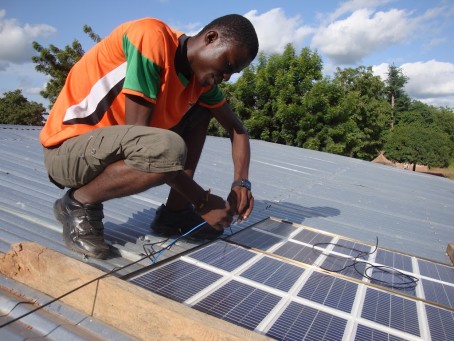Africa is the continent that contributes least to climate change, yet it is impacted more harshly than others and lacks support to innovate, says the Portuguese presidency of the EU Council, which organized an EU-Africa Green Talk in Paris on Tuesday (13 April). The forum saw economists, diplomats and companies exchange views about the importance of the energy transition on the African continent. “We need an ecological transition that matches our needs, but we don’t have the means available to invest. We are waiting to be able to mobilize resources internationally so that there are sustainable interest rates for our transition,” said Lionel Zinsou, economist and former prime minister of Benin. Zinsou also added that while the transition will be easier in Africa because there is “no legacy” of fossil energy use, there are other impediments.
Sandra Lagumina, deputy chairwoman of Meridiam investment fund, which finances green investments in Africa, said that the lack of investment is compounded by other factors such as a regulatory framework that continued to favour non-renewable energies, the failure of projects even before they are implemented or a weak renewable energy distribution network. The Meridiam fund will invest up to €3 billion in Africa over the next 25 years. Ana Paula Zacarias, Portugal’s secretary of state for European affairs, said that even with all the difficulties, European funding for this transition is essential since the African continent is the most affected by global warming. While Africa is the continent that contributes the least to greenhouse gas emissions, the countries there suffer most from climate change. “In some regions of Africa, global warming is twice as fast as in other parts of the world,” said the Portuguese minister.
This will be one of the main topics on the table of the High-Level Forum between the European Union and Africa on green investment, scheduled for 23 April. The French government also expressed its interest in advancing environmental diplomacy with Africa, maintaining high energy standards inside and outside the borders of the 27 member states. “We have to protect ourselves from environmental dumping, and that is why we hope there will be a desire to create a mechanism for taxing the use of fossil fuels at our borders,” Clément Beaune, French secretary of state for European affairs added. This effort in Africa will be financed in part by the European Investment Bank, which said it took into account not only the effects on energy production and consumption when supporting projects abroad, but also “their social impact”, according to Grégoire Chauvière Le Drian, head of the EIB’s representation in Paris.




